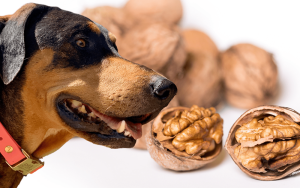Can Dogs Eat Avocado? Everything You Need to Know About Avocado and Your Dog’s Health

Introduction:
Avocados have become a trendy superfood for humans, packed with healthy fats, vitamins, and minerals. But as dog owners become more health-conscious about their pets’ diets, questions arise about whether it’s safe to feed our furry friends this creamy
fruit. Can dogs eat avocado? Is it good for them, or does it pose risks? In this comprehensive article, we will explore the truth behind avocados and dogs. By the end, you’ll have a clear understanding of the potential benefits and dangers of feeding
avocado to your dog.
What is an Avocado?
Before delving into whether dogs can eat avocado, it’s important to understand what an avocado is. Scientifically classified as a berry, the avocado (Persea americana) is native to Central and South America and belongs to the Lauraceae family. Known for
its buttery texture and rich flavor, the fruit is a nutritional powerhouse for humans. Avocados are high in monounsaturated fats, fiber, vitamins such as Vitamin K, E, and C, and essential minerals like potassium and magnesium.
However, while avocados offer significant health benefits for humans, the question remains: are they safe for dogs?
The Risks of Feeding Avocado to Dogs
While avocados are nutrient-rich, they contain a substance called persin, a fungicidal toxin found primarily in the pit, skin, and leaves of the avocado plant. Persin is harmless to humans but can be toxic to certain animals, including birds and large
animals like cows and horses. When it comes to dogs, the risks associated with avocado consumption stem from the following:
-
Persin Toxicity:
- Dogs are relatively resistant to persin toxicity compared to other animals, but consuming large amounts of avocado, particularly the pit, skin, or leaves, can cause adverse reactions.
- Symptoms of avocado toxicity in dogs may include vomiting, diarrhea, and abdominal discomfort. Severe cases of poisoning, while rare, could lead to more serious health issues.
-
High Fat Content:
- Avocados are high in fat, which, while healthy for humans, can be too much for dogs, particularly those prone to pancreatitis or obesity.
- Excessive fat in a dog’s diet can lead to gastrointestinal upset, and in some cases, may contribute to more serious conditions like pancreatitis, which is an inflammation of the pancreas.
-
Choking Hazard:
- The avocado pit is large and hard, posing a significant choking hazard, especially for small dogs. If swallowed whole, the pit can also cause an intestinal blockage, which may require emergency surgery to remove.
-
Risk of Gastrointestinal Distress:
- For some dogs, eating too much avocado, even without the pit or skin, can cause an upset stomach, resulting in symptoms like diarrhea, vomiting, and loss of appetite.
Can Dogs Eat Avocado Safely?
The answer is not a simple “yes” or “no.” Avocados can be safe for dogs to consume in moderation, but there are important precautions to consider. Here are the key points to keep in mind:
-
Remove the Pit, Skin, and Leaves:
- If you decide to feed your dog avocado, only give them the flesh of the fruit. Make sure to completely remove the pit, skin, and any leaves. These parts of the avocado contain persin, which is more concentrated in the pit
and skin, and can be harmful to dogs.
- If you decide to feed your dog avocado, only give them the flesh of the fruit. Make sure to completely remove the pit, skin, and any leaves. These parts of the avocado contain persin, which is more concentrated in the pit
-
Moderation is Key:
- Avocado should be considered a treat, not a regular part of your dog’s diet. A small amount of avocado flesh (about a tablespoon for small dogs and a bit more for larger dogs) can be a healthy snack, but it’s important not to overdo it due
to the high fat content.
- Avocado should be considered a treat, not a regular part of your dog’s diet. A small amount of avocado flesh (about a tablespoon for small dogs and a bit more for larger dogs) can be a healthy snack, but it’s important not to overdo it due
-
Watch for Signs of Allergies:
- Like any new food, avocado can trigger allergies in some dogs. Start with a small amount and monitor your pet for any signs of distress, such as itching, swelling, or digestive issues.
-
Know Your Dog’s Health Conditions:
- Dogs with specific health concerns, such as pancreatitis, obesity, or sensitive stomachs, should avoid avocados altogether. Always consult with your veterinarian before introducing new foods to your dog’s diet.
What Are the Benefits of Avocado for Dogs?
Despite the potential risks, avocado does offer some health benefits when given properly and in moderation. Here are some of the advantages:
-
Nutrient Boost:
- Avocados are rich in healthy fats, particularly monounsaturated fats, which can be beneficial for your dog’s coat and skin when given in moderation.
- The fruit also contains fiber, which can aid digestion and promote healthy bowel movements.
-
Vitamins and Minerals:
- Avocados provide essential vitamins such as Vitamin E (an antioxidant that supports the immune system), Vitamin K (important for blood clotting), and Vitamin C (which helps with tissue repair and immune function).
- The fruit also contains potassium, which supports healthy muscle function, and folate, which is important for overall cellular function.
-
Anti-inflammatory Properties:
- Avocados contain compounds like carotenoids and polyphenols, which have anti-inflammatory properties that may be beneficial for dogs with arthritis or other inflammatory conditions.
-
Healthy Skin and Coat:
- The healthy fats found in avocados may help improve the condition of your dog’s skin and coat, reducing dryness and promoting a shinier, healthier appearance.
How to Safely Feed Avocado to Your Dog
If you’ve decided to try avocado as a treat for your dog, it’s important to do so in a safe and controlled manner. Here are a few tips:
-
Start Slowly:
- If your dog has never eaten avocado, start by offering a very small amount and monitor for any adverse reactions. Some dogs may be sensitive to even small amounts of avocado.
-
Serve Fresh Avocado:
- Always feed your dog fresh, ripe avocado. Avoid offering processed avocado products like guacamole or avocado dips, which may contain added ingredients like garlic, onions, or spices that can be toxic to dogs.
-
Remove All Potential Hazards:
- Be vigilant in ensuring that your dog does not have access to the avocado pit, skin, or any leaves. These parts of the avocado contain concentrated levels of persin and should be discarded properly.
-
Offer Avocado as an Occasional Treat:
- Remember that avocado should not be a regular part of your dog’s diet. Offer it occasionally as a special treat rather than a daily snack.
What to Do if Your Dog Eats Avocado
If your dog accidentally eats avocado, it’s important to monitor them closely for any signs of illness. If your dog consumes a small amount of avocado flesh and is otherwise healthy, they may experience no adverse effects. However, if your dog eats a
large quantity or the pit or skin, you should be prepared to take action:
-
Monitor for Symptoms:
- Keep an eye out for symptoms like vomiting, diarrhea, abdominal pain, or lethargy. If any of these signs appear, contact your veterinarian immediately.
-
Consult Your Veterinarian:
- If your dog consumes the avocado pit, or if they show signs of severe distress, such as choking, difficulty breathing, or an inability to keep food down, seek veterinary assistance right away.
Conclusion:
In summary, while dogs can eat avocado in small amounts, it should be given with caution. The fruit’s high-fat content and potential for persin toxicity in the pit, skin, and leaves mean that you need to take care when feeding your dog this fruit. Always
remove the pit and skin, and offer only the flesh of the avocado as an occasional treat. If you’re ever unsure about whether a food is safe for your dog, it’s always best to consult with your veterinarian. By understanding the potential risks and
benefits, you can make informed decisions to ensure your dog’s health and well-being.
4o






